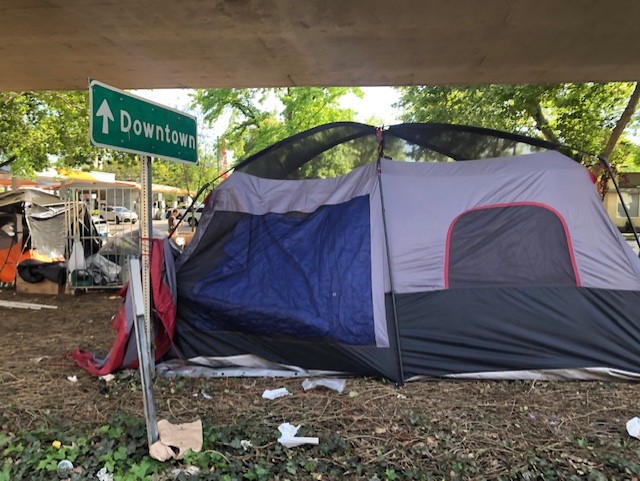
Sacramento homeless living under W/X freeway offramp, April 15, 2022. (Photo: Katy Grimes for California Globe)
Sacramento Currently Spending $44 Million on Growing Homeless
City is also increasing garbage collection on residents by double digits
By Katy Grimes, April 18, 2022 8:15 am
The City of Sacramento is spending more than $44 million to provide eight homeless shelters and camping options, most not yet built or ready, and three Project Homekey motel conversions. According to city officials, “most of that comes from state and federal grants that are not certain year to year.”
This homeless spending comes on the heels of city residents learning that waste collection services are going up drastically: 4.0% increase for recycling, 4.50% increase for garbage, 20.50% increase lawn and garden, and 7.0% increase for street sweeping.
Senate Bill 1383, authored by then-Sen. Ricardo Lara and signed into law by Gov. Jerry Brown in 2016, requires organic waste (food waste) be recycled to reduce methane, “climate pollutants” and greenhouse gas emissions in landfills.
Sacramento County has more than 11,000 homeless living on the streets and in the parks, and all shelter beds and spaces are full on any given night.
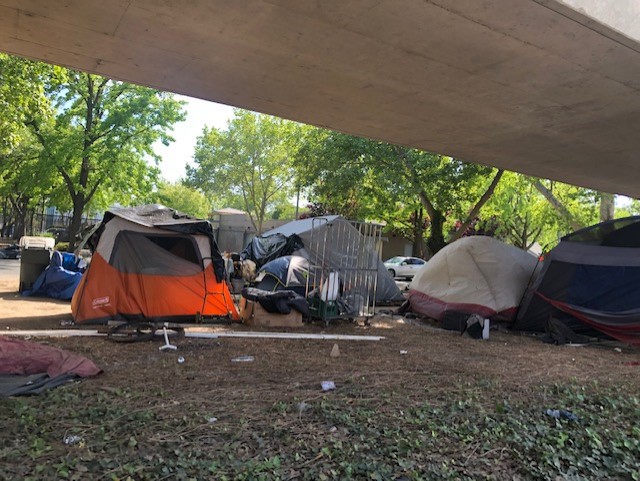
The Mayor and City Council now calls Sacramento’s drug-addicted, mentally ill homeless vagrant population the “unhoused,” “people experiencing homelessness,” “guests,” and “our unhoused neighbors,” as if these really are our neighbors who were just one paycheck away from living on the streets. Nothing could be further from the truth.
Despite the uncertainty of ongoing funding, the City is planning on these various shelters into 2023. “We think for 2023 we have pulled together the funds to cover the shelter piece, from both the State Homeless Housing Assistance and Prevention (HHAP) grants and by redirecting some funds within the Department of Community Response budget.
While the city’s total siting plan involves 20 potential sites, City staff said they are currently focusing efforts on eight sites, “that have shown the most potential for development and activation. Some of these sites have been added to the plan in recent months.”
This is the status of the eight proposed and existing homeless sites:
- Joshua’s House is a private hospice facility not yet built on a city-owned lot in North Sacramento. The developer recently applied for a permit and the site could be up and running late this year.
- Miller Park Safe Ground is a 60-tent low barrier shelter has been opened since Feb. 8. It has already served approximately 140 people, 25 of whom have moved on into positive settings.
- Auburn Boulevard Respite Center is sited at the former Science Center Museum. It is in use now as administrative space for Hope Cooperative and Department of Community Response outreach teams. It is ready to be used as a respite center for adverse weather conditions.
- North 5th Street is an existing 104-bed shelter which, under the siting plan, has been expanded to 145 beds and will add another 18 in July for a total of 163.
- Downtown Service Hub is an unnamed location that is the subject of ongoing negotiations to purchase the building and use it as a central hub for homeless and the service providers who work with them.
- Colfax Yard is a vacant city-owned vacant lot not yet ready for official use being used now as an unsanctioned parking spot by homeless. The State Water Board ordered an environmental clean up for longer-term, sanctioned safe parking. The homeless there now will need to vacate.
- Roseville Road RT Station is currently used unofficially by homeless parking vehicles. The city is working on a three-way agreement among the City, RT and Cal Trans. When completed, that agreement will allow between 50 and 70 vehicles to safely park there.
- The 102-acre Job Corp site was recently purchased as federal surplus land, not accessible yet. In the short term, the site requires new road access and other improvements before part of it could serve as a safe parking site.
Currently available shelter for homeless totals 164 spots according to this list – 104 actual beds, and 60 tents in a public park.
Sacramento has more than the 11,222 homeless people accounted for Sacramento in 2019-2020. Where are they sleeping? We don’t know how many are sleeping in their cars in designated parking lots, and other default parking locations.
Again not yet ready or opened are three Project Homekey motel conversions, La Mancha, Vista Nueva, and Central Sacramento, the City is working on with the Sacramento Housing and Redevelopment Agency on, expected to provide more than 300 rooms to be used mostly as supportive and transitional housing.
Last month the Globe reported that Sacramento city manager Howard Chan warned the City Council that future funding for the city’s existing homeless shelters was uncertain, even as the City Council was pushing to open more large homeless sites to address Sacramento’s growing homelessness crisis.
“Chan this week told the council the city can’t count on having the $33 million it needs to provide the roughly 1,000 spaces it currently offers past July 1. That’s in contrast to the council’s August direction to free up $100 million to open 20 new sites for homeless shelters, tiny homes and Safe Ground sanctioned encampments,” the Bee reported.
$33 million to provide 1,000 spaces is $33,000 per space. Who is the city paying that kind of money? What is it going to take to get to the bottom of this bottomless pit of homeless funding?
The Globe also reported that Sacramento Steps Forward, responsible for “continuum of care” for the homeless, had a really fuzzy mission with really big funding.
“The Globe tried to access other Sacramento Steps Forward annual reports since 2011 on its website, but there are no live links.
In 2019-2020, Sacramento Steps Forward received $25,990,012 from the State, and $23,349,292 from the Federal government (above). Most of the nearly $50 million was earmarked for housing. They spent nearly $802,000 on “administration.”
Notably, mental health and drug addiction treatment is not identified on these charts.”
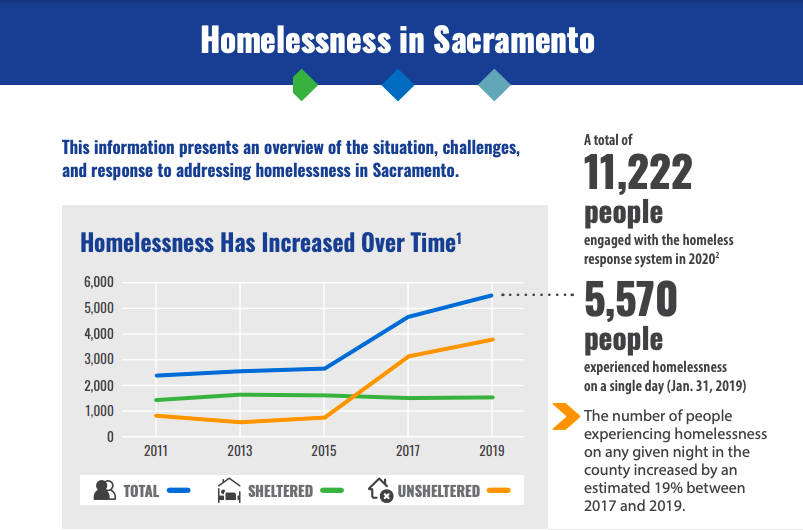
Of the 11,222 homeless people in Sacramento in 2019-2020, Sacramento Steps Forward says “2,761 people achieved permanent housing, 4,418 people remained connected to the system. The system lost contact with 4,043 people.”
So Sacramento spent nearly $4,400 per homeless person in 2019-2020, only to “lose contact” with 4,043, and “house” 2,761. And it took $50 million to do this?
As local government watchdog, Eye On Sacramento think tank President Craig Powell said, “Sacramento Steps Forward has manifestly failed in its basic mission to reduce homelessness. It operates in a no man’s land between city and county government with neither government directly responsible or accountable for its chronic failure to perform.”
The Globe is pleased that the City has partnered with WEAVE Inc. and St. Johns Program for Real Change, offering transitional living spaces for women who are escaping domestic violence and recovering from substance use disorder.
Demonstrating the ineffectiveness of the City, Sacramento Mayor Darrell Steinberg floated an alarming idea at his State of the City address in January: with so many state workers continuing to work remotely long-term, he’d like to utilize empty state offices for housing the city’s homeless.
And that is the primary problem with how Mayor Steinberg has addressed homelessness: as if it’s a housing problem, rather than a mental health and drug addiction problem.
The homeless “guests” which the city speaks of, as if we are offering concierge services, are not getting the actual services they need – mental health treatment, drug addiction treatment, counseling, and policing – as the city spends only on housing – a failed policy they keep repeating.
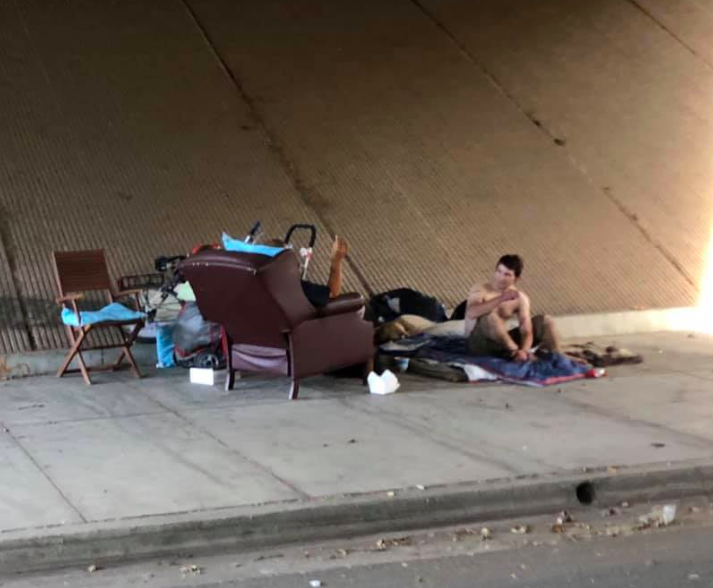
- Legislation Would Conceal California High-Speed Rail Records from Public - February 18, 2026
- ‘King of Cringe’ Rep. Eric Swalwell isn’t just Weird – He May Have Legal Troubles - February 18, 2026
- Why is Gov. Newsom Giving $90 Million in Taxpayer Funds to Planned Parenthood? - February 17, 2026

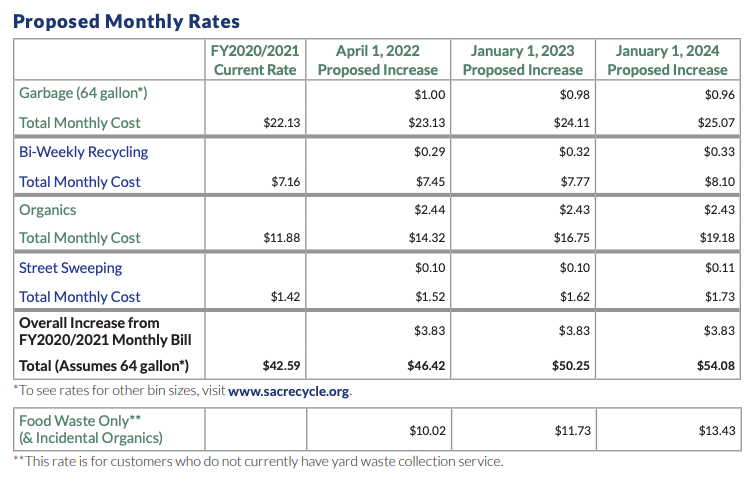

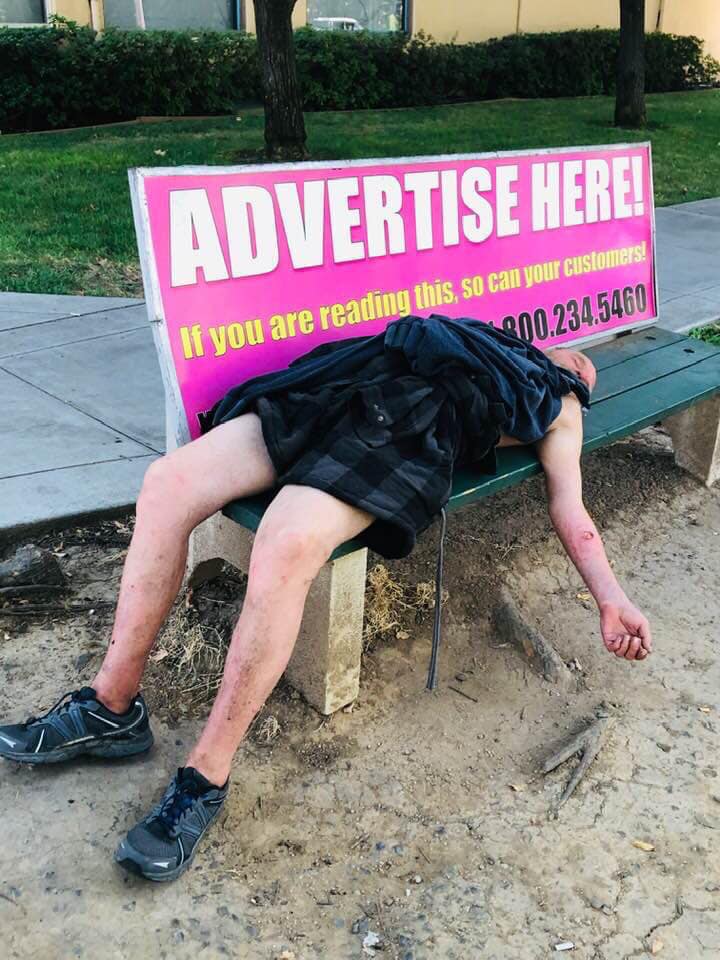
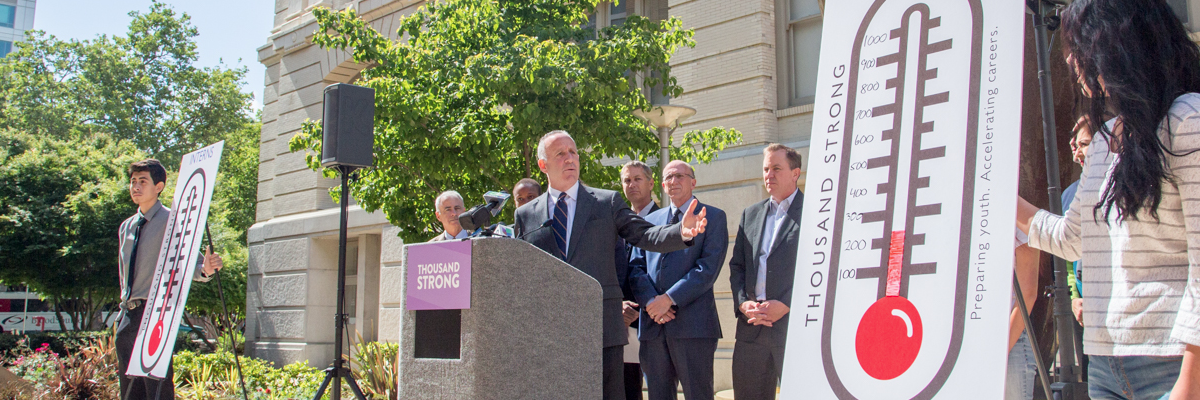
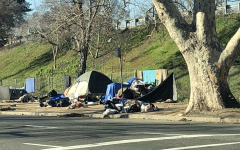
When the voting public get angry enough about an issue it then gives the politicians license to spend the voting public’s money. If the voting public is fed up enough then the voting public will turn their head when their money is being spent unwisely and given to the friends and donors of the politicians.
It is a game and we are being gamed!
When will this end?
When we outlaw ballot harvesting as the wise people of Alabama have done.
Find out which state the bums come from and back bill that state.
44 million dollars spent on 10,000 homeless.
What a shame! Raise our taxes to pay for the politicians mistakes as they continue to ignore the fact that AB109 , prop 57 and prop 47 are the REAL reasons why the homeless situation have reeled out of control.
We have empty prisons all over the state. Why don’t we use those to house the homeless instead of building new facilities? They have kitchens, bathrooms etc…
Why do we have to house them? Make them leave the city!
For homelessness to get resolved needs a process on working on the mental issues, weaning off drugs, and “teaching them to fish” (giving them work opportunities to get out of their predicament).
Housing does not make them more independent nor gives them a way to become independent if anything this housing provides them with increased drug abuse and worsens their mental issues.
I remember back in the day there were job core programs and housing that connected to these job cores…that would help to bring this back. It seems this 44m is being thrown with no solution behind it.
This might work if, 1. They wanted off the drugs, 2. they want to work. Most of them are perfectly happy with things as they are
growing the homeless. think about that. its not a problem to them, it is a tactic. they need dependents to justify themselves.
Sacramento and all of CA’s cities need new leadership or all we will see from now until forevermore is endless nonsense-talk and slush-fund building and re-runs of the same old B.S. as the current crop continues to worship the Homeless Industrial Complex, which has been very good to them. They are so contemptuous of the citizenry it seems they don’t even bother to hide their shadiness anymore. Electing decent leadership is probably a get-out-the-vote matter. As I recall, only 14% of registered voters voted for L.A. Mayor — that would be Eric “Yoga Pants” Garcetti — last time around. This kind of apathy is engineered over time by the bad guys, of course, so they can win. Make sure incensed voters vote and maybe we have a shot next time around.
When you subsidize a thing, you get more of that thing you subsidized. When you spend a boatload of cash on the homeless, you get a boatload of homeless people – not less. Funny how that works.
True if you just subsidize without any requirements, which it sounds very much like Sacto is doing. And that giving without requirements comes directly from the misanalysis of the problem: e.g., it isn’t homelessness (due to some vague “economic issue”) that is the issue, it is drug/alcohol/mental issues that cause the vast majority of homeless.
Reno, Nevada offers more shelter for homeless than Sacramento, but it isn’t for free.
The mayor et al should be run out town on a rail!
Round them up, brand them, and ship them to the border. If they get caught again, they go to jail for a year. While in jail they have to work at county support jobs. Road work, garbage clean up and civic improvemnent projects. In 5 years there would be no homeless in CA.
Homeless shelters are a 33million dollar business for Sacramento, directors like demitrus and Amanda profit so well. They want repeat customers that’s a bad things. Non profit organization benefit employees not clients. Homeless people some aren’t drug addicts drunks or from prison or crazy, there treated all same. hospitals and cops treat them bad sometimes because views of Homelessness. Sacramento most shelters are in river district. There’s 11000 homeless people. It can be very hard to get a shelter especially a descent one. Some residents are very nice and some straight up abusive as hell. There more inclined to help people from prison the adult males with health conditions. If you complain about people threatening you or verbal abuse, they don’t care they really don’t want to deal with it. If you report physical assualt they will kick you out. Especially if you make a police report. If you don’t have a car it’s hard to get a job, if you don’t get employment within two months some staff will be verbally abusive or threatening and they will get away with it.
Worse shelter is shelter inc, no bus passes or clothes it’s impossible to get out.80 men to one shower First step you have drug addicted staff. They very nice which helps, they will allow staff to be verbally abusive and threatening,they will lie about it.oak park. first step is bad too. Ugm is most nice but offer no assistant to get out of homelessness or any place for belongings, force christian service everyday,
If you work you can be drunk as fuck all the time. Shelter directors are all the same including navigation center if you get picked on they don’t care they won’t help they make it your fault. Staff will retaliation for reporting verbally abuse and threats of violence. We spent our whole lives paying taxes for homeless shelters, it’s easier to have the revolving door in shelters to increase grants. Homelessness is due to high living expenses and a difficult economy. What’s homeless your a social outcast and staff think there better then you it’s very clicked, some are nice. Some will through away your insulin. I got beat withmetal bat at shelter inc, they kept the aggressor who’s a drug addict for his department of corrections funding.
Gavin newsom this is why suicide is easier then escaping homelessness and it’s not mental illness, only bad if you survive. Homeless shelters are half way houses it’s like prison with more privileges and more drunk inmates.
I’m a type 1 diabetic and suffered trauma through homelessness competing with 11000 homeless people for work and non homeless people with a year gap of work. It’s unlikely I’ll ever get out. I miss my friends , orphan life.